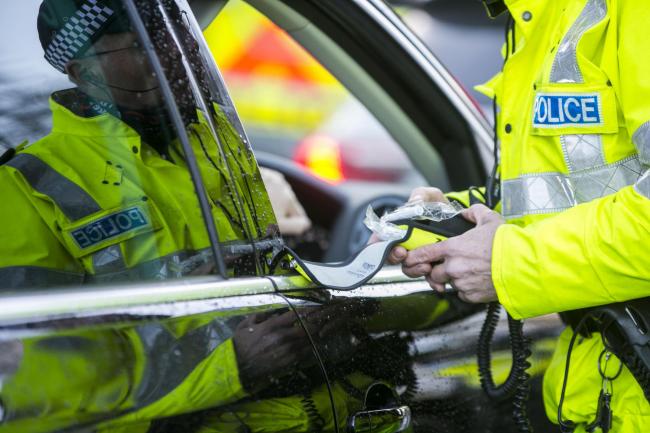THE number of drug driving arrests made as part of an annual police crackdown have almost tripled in two years, new figures have revealed.
Hampshire Police say they made 74 drug driving arrests over the most recent Christmas period, as part of their annual campaign Operation Holly.
That's three times more than the 24 arrests made in 2016.
The figures also show a small rise in the number of drink driving arrests across Hampshire, with police making 201 arrests throughout December.
Police chiefs say it is "disappointing" that drivers are still taking risks and accused offending drivers of "being complacent about the realities of road deaths and serious injuries."
 (A driver is talked to by a police officer holding a breathalyser)
(A driver is talked to by a police officer holding a breathalyser)
The figures, released today, come following Operation Holly – a month long joint crackdown between Hampshire and Thames Valley police forces.
In total, more than 4,200 breath tests were carried out across the two areas in the month long campaign, from December 1, 2018, to January 1, 2019.
More than 280 drivers were tested for drugs, of which half had a positive result.
In total, 666 impaired drivers were arrested across the two force areas.
Of those, 275 were arrested for drink and drug driving offences were in Hampshire and the Isle of Wight.
Southampton was the area with highest number of arrests in Hampshire, while the worst offending drink driving age group was 35-49.
The highest number of drug drivers came from the 17-24 age group.
Compared to last year’s Operation Holly results, the average number of drink drive arrests has fallen by five per cent across both forces, though there was a small rise in Hampshire alone.
However, the figure for drug drivers has increased on average by 28 per cent.
Road Safety Sergeant Rob Heard, from the Roads Policing Unit for Hampshire Constabulary and Thames Valley Police said: “This year we have been very intelligence-led and worked closely with our partners from other organisations to help remind people of the dangers and consequences of impaired driving.
“We’ve seen a small drop in the number arrested for drink driving, which is good however there continues to be a steady rise in the number caught for drug driving over the last few years."
Mr Heard said the increase in drug driver arrests was likely to be due to new roadside testing equipment, which was made available in 2015.

He said: “We need to consider that the increase in drug driver arrests is not necessarily because we have more drug drivers on the road but that officers can conduct road side drug testing, using drug analysers to test for a level of certain illegal drugs in a person’s saliva, which wasn’t available pre-2015.
"The difference being that there only needs to be a trace of one of the eight illegal drugs and no proof of impairment is required for a conviction."
Mr Heard added: "Our message is simple – don’t mix drink or drugs with driving, they may stay longer in your system than you think – It’s not worth the risk.
"Such behaviour on our roads has far-reaching effects not just for the impaired driver, but for any innocent road users affected by their destructive decisions.
"It is disappointing that some people still take that risk.
"Too many people continue to be complacent about the realities of road deaths and serious injuries.
"That’s why we want everyone to be clear about their responsibilities, and have respect for each other on the road.”









Comments: Our rules
We want our comments to be a lively and valuable part of our community - a place where readers can debate and engage with the most important local issues. The ability to comment on our stories is a privilege, not a right, however, and that privilege may be withdrawn if it is abused or misused.
Please report any comments that break our rules.
Read the rules hereLast Updated:
Report this comment Cancel